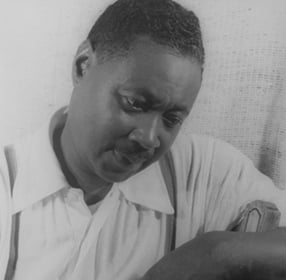The roosters give the signal for daybreak,
And through my window pours the grey of morn;
Refreshing breezes fan me as I wake,
And down the valley sounds the wesly horn.
Day broadens, and I ope the window wide,
And brilliant sunbeams, mixing, rush between
The gaping blinds, while down at my bedside
I kneel to utter praise to the Unseen.
The torch-light glistens through the wattle-pane,
And clouds of smoke wreathe upward to the skies;
My brother at the squeezer juices cane,
And visions of tea-hour before me rise.
Leaving the valley’s cup the fleeting fog
Steals up the hill-sides decked with sunbeams rare,
Which send their search-rays ’neath the time-worn log,
And drive the sleeping majoes from their lair.
But there are some that yest’reve was the last
For them to sleep into their watery bed;
For now my treacherous fish-pot has them fast,
Their cruel foe which they had so long dread’.
Right joyfully I hear the school-bell ring,
And by my sister’s side away I trot;
I’m happy as the swee-swees on the wing,
And feel naught but contentment in my lot.
I lightly gambol on the school-yard green,
And where the damsels by the bamboo grove
In beautiful and stately growth are seen,
For tiny shiny star-apples I rove.
. . . . . .
The morning wind blows softly past my door,
And we prepare for work with gladsome heart;
Sweetly the wesly horn resounds once more,
A warning that ’tis time for us to start.
I scamper quickly ’cross the fire-burnt soil,
And the coarse grass-tufts prick my tender feet;
I watch my father at his honest toil,
And wonder how he stands the sun’s fierce heat.
A winding footpath down the woodland leads,
And through the tall fox-tails I wend my way
Down to the brooklet where the pea-dove feeds,
And bucktoes in the water are at play.
And watching as the bubbles rise and fall,
I hear above the murmur of the dale
The tropic music dear to great and small,
The joyous outburst of the nightingale.
. . . . . .
Gone now those happy days when all was blest,
For I have left my home and kindred dear;
In a strange place I am a stranger’s guest,
The pains, the real in life, I’ve now to bear.
No more again I’ll idle at my will,
Running the mongoose down upon the lea;
No more I’ll jostle Monty up the hill,
To pick the cashews off the laden tree.
I feel the sweetness of those days again,
And hate, so hate, on the past scenes to look;
All night in dreaming comes the awful pain,
All day I groan beneath the iron yoke.
In mercy then, ye Gods, deal me swift death!
Ah! you refuse, and life instead you give;
You keep my here and still prolong my breath,
That I may suffer all the days I live.
. . . . . . .
’Tis home again, but not the home of yore;
Sadly the scenes of bygone days I view,
And as I walk the olden paths once more,
My heart grows chilly as the morning dew.
But see! to-day again my life is glad,
My heart no more is lone, nor will it pine;
A comfort comes, an earthly fairy clad
In white, who guides me with her hand in mine.
Her lustrous eyes gleam only tender love,
And viewing her, an angel form I see;
I feed my spirit on my gentle dove,
My sweetheart Lee, my darling Idalee.
And where the peenies glow with grenish fire,
We kiss and kiss and pledge our hearts as true;
Of sweet love-words and hugs we never tire,
But felt more sorry that they were so few.
. . . . . .
I leave my home again, wand’ring afar,
But goes with me her true, her gentle heart,
Every to be my hope, my guiding star,
And whisperings of comfort to impart.
Methinks we’re strolling by the woodland stream,
And my fame thrills with joy to her her sing:
But, O my God! ’tis all—’tis all a dream;
This is the end, the rude awakening.
From Songs of Jamaica (Aston W. Gardner & Co., 1912) by Claude McKay. This poem is in the public domain.

